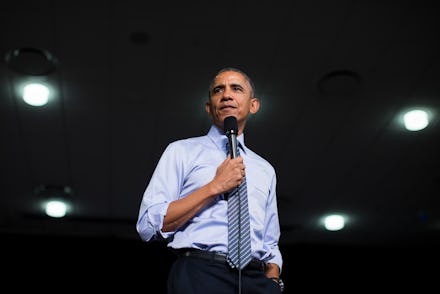Obama and the White House Are About to Step Up the Fight Against the Islamic State

The news: The White House is planning to ask Congress for new authority to bolster America's fight against the Islamic State terrorist group. On Tuesday or Wednesday, President Barack Obama is expected to send a "blueprint" to Capitol Hill in what would be the first vote on a conflict that is already six months old.
This would be the first official Congressional war vote in 13 years, reports the Associated Press, but it is not likely to be a simple one. The U.S. has already been leading an international coalition against Islamic State, including an air campaign that began in August. However, because the White House failed to seek formal Authorization for Use of Military Force, some members of Congress are reportedly concerned about what could be seen as Obama overreaching his authority.
The plan: According to Reuters, the Obama administration has thus far justified the campaign's legality based on the authorization that former President George W. Bush received in 2001 for fighting al-Qaida and in 2002 for the Iraq War.
Critics are already calling this a stretch, but the situation could become even more heated when the White House extends the mission even further. Even though Obama will reportedly end the authorizations given to those missions, CNN reports that the upcoming proposal would include request for a three-year mission so that the next president wouldn't have to gain new approval from Congress when his or her term starts in 2016.
This has led to concerns from both sides of the aisle about the potential balancing act between fighting the ultra-violent Islamic State and avoiding another prolonged and bloody American conflict in the Middle East. To satiate these concerns, the White House will have to consider the scope of the mission's geographical reach, as well as restrictions on total numbers of boots on the ground.
Details of either of these aspects have yet been made clear. A White House official did tell AP that geographical restrictions would not be pursued, but restrictions on fighting Islamic State or any off-shot group would be.
The response: Even before the blueprint proposal has been delivered, lawmakers are already weighing in on how to handle any upcoming conflict.
"You have one set of people like Sen. [John] McCain who want to grant the administration a virtual blank check, as far as I can tell, and then you've got folks who learned from the mistakes of the Iraq War and want to limit the authority. That's just going to be a difficult balance," Rep. Chris Van Hollen (D-Md.) told CNN.
Sen. Orrin Hatch, (R-Utah), on the other hand, seemed adamant about making sure any balance reached is flexible enough to handle the threat and not leave U.S. soldiers in a tough spot.
"Most importantly, the authorization should not impose any artificial and unnecessary limitations such as those based on time, geography and type of force that could interfere with our strategic objective of defeating Islamic State," Hatch said on the Senate floor Monday .
As Sen. Robert Menendez (D-N.J.) told the AP on Monday, "Finding the balance is the challenge here."
What's next? The news comes shortly after the United Arab Emirates resumed its air strike campaign against Islamic State and just days after Jordan vowed to "wipe them from the face of the Earth." It's not clear whether this had any effect on the White House's reinvigoration, but there does seem to be a general global consensus that the group is a real military threat than needs to be seriously addressed.
With potentially hundreds of thousands of members, Islamic State has become a highly organized, highly profitable and highly dangerous group. While most lawmakers seem to be in agreement about avoiding another costly entanglement in that part of the world, the upcoming White House proposal will shed some light on what's to come.